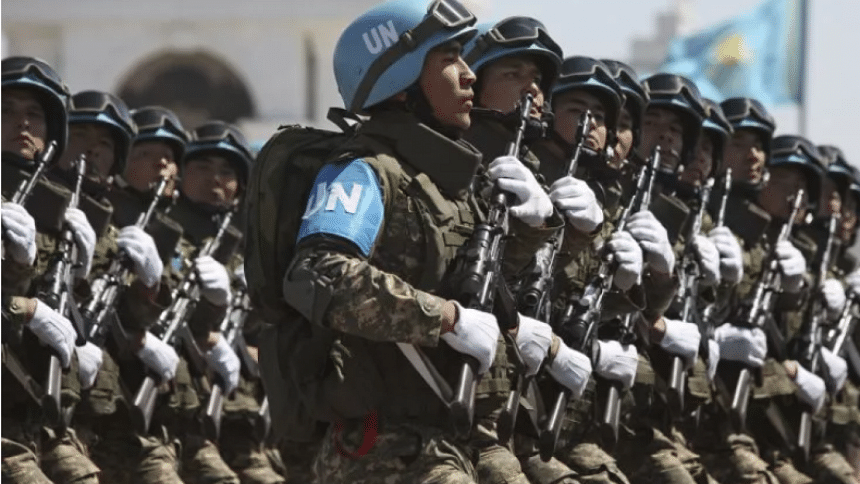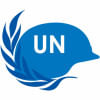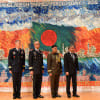The power of partnerships: Why supporting our peacekeepers matters more now than ever

Every day, United Nations peacekeepers work to protect hundreds of thousands of vulnerable people in the world's most fragile political and security situations.
Our civilian and uniformed personnel support ceasefires, prevent and respond to violence, investigate human rights violations and abuses, and help build peace, recovery, and development in conflict-affected countries. There is no doubt that lives are saved and changed by their presence.
In South Sudan, more than 80 percent of respondents to a recent perception survey reported feeling safer due to the presence of UN peacekeepers. Communities in other conflict zones also testify about the impact of peacekeeping. During operation "Let Peace Reign" in the Central African Republic, local leaders reported that increased patrols were deterring armed groups while the provision of clean water, medical assistance, and road rehabilitation by peacekeepers had significantly improved their lives. "It prevents the enemies of peace in our region so that peace returns, allowing us to move freely," said Iyo Feikoumon from Doyi Village.
In some peace operations, a primary task is to provide robust protection of civilians due to the nature of the threat on the ground. Our military and police personnel make every effort to carry out this mandate in challenging and, often dangerous, conditions. However, the ultimate objective is to create the conditions for political solutions and sustainable peace. That is the true measure of our success.
Achieving that outcome is becoming more difficult in an increasingly tense global political and security climate.
Conflicts are more complex and multi-layered with local tensions fueled by national, regional, and international forces acting in their own interests. An increasing number of actors are involved in violence, including criminal, terrorist, and other armed elements. It is difficult to engage with these individuals and groups, with diverse motives and objectives and often links to transnational organised crime, because they have no real interest in reaching political settlements that foster lasting peace.
We are witnessing a less united approach to conflict resolution among global powers due to widening political divisions which, in turn, takes the pressure off warring parties to end violence and make concessions. These divides are exposed in Security Council resolutions relating to peacekeeping mandates, with less unanimity in the decisions made by Member States, notably on mandate renewals, but also less support to our missions when they face challenges on the ground.
A surge in mis- and disinformation is also creating new and growing threats to the safety of UN personnel and the communities they serve. In places like Mali, Central African Republic and the Democratic Republic of Congo, fake news fuels fighting as well as hostility towards peacekeeping missions. We are experiencing an increase in attacks on our bases, ambushes of convoys, and the increased use of improvised explosive devices. In this environment, the iconic blue flag that should provide safety for peacekeepers now risks making them a target.
Despite our best efforts to keep personnel safe, more peacekeepers are being injured or killed in these volatile conditions. The frequency of malicious attacks against peacekeepers increased from 280 in 2020 to 463 last year. In 2021, there were 24 fatalities due to these violent acts.
Among those we have lost are eight peacekeepers who died when their helicopter went down in the eastern DRC in March, during a reconnaissance mission to help protect civilians. I attended a very moving memorial service alongside colleagues in Goma. We all understand that risk, and loss, is inevitable given the nature of our work but, coming together in these tragic circumstances reminds us of the immense price paid by fallen peacekeepers and their families. I want to pay tribute to them. Their sacrifice inspires us to redouble our efforts to build peace and stability.
UN peacekeeping is not alone in this endeavour. Many partners work alongside us in the cause of peace.
Among them are humanitarians who provide life-saving assistance to the most vulnerable. Strong partnerships with communities are also critical. They inspire us with their resilience and persistence in helping resolve tensions, supporting reconciliation, and building peace. Women and youth are also vital partners as powerful champions for peace as are civil society and the media who shine light on the challenges and help promote solutions. We continue to strengthen our partnerships with the 122 Member States that contribute more than 75,000 military and police personnel to our 12 peacekeeping operations. We rely on the consent and active participation of host governments as well as the strong, united support of regional and international partners to persuade parties to put aside their differences and make the necessary concessions to reach political settlements.
That is why, this year, we are marking the International Day of UN Peacekeepers under the theme "People. Peace. Progress. The Power of Partnerships." It is a chance to thank partners for their contributions and to issue a fresh call to action in the pursuit of global peace and security.
Peacekeeping is an imperfect tool that can never meet all needs or expectations. There are times when we are prevented from, or fail to carry out our mandates, and let ourselves, and those we serve, down, including in cases of misconduct by our personnel.
When this happens, we will continue to be held accountable, to constantly interrogate our performance, and find ways to be more innovative and effective, particularly through the Action for Peacekeeping initiative, which establishes priority areas where progress is needed. This includes strengthening our capacity to advance political solutions and support sustainable peace, improving protection of civilians as well as the safety of peacekeepers, implementing the Women, Peace and Security Agenda, and rigorously evaluating our own performance.
Our goals are ambitious and not all will be achieved.
Questions may sometimes be asked about the value and impact of peacekeeping.
But if not peacekeeping, what else? Does a better solution exist today to maintain ceasefires, protect civilians, prevent chaos, and support peace efforts in the complex, conflict-affected environments where our operations are deployed?
Despite these questions, and in the face of many challenges, UN Peacekeeping will persevere alongside our partners, to be a strong force for change in a collective effort to achieve peace and progress for all peoples.
Jean-Pierre Lacroix is the United Nations under-secretary-general for Peace Operations.

 For all latest news, follow The Daily Star's Google News channel.
For all latest news, follow The Daily Star's Google News channel. 








Comments